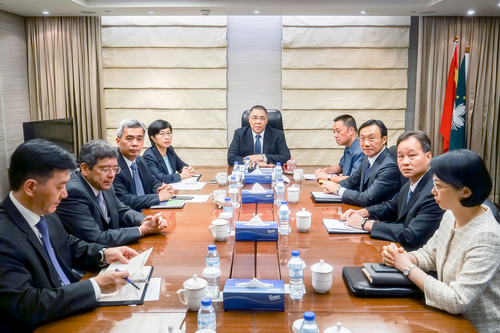 The Chief Executive, Mr Chui Sai On, presides at a meeting of the Commission for Reviewing and Monitoring the Improvements of the Response Mechanism to Major Disasters.
The Chief Executive, Mr Chui Sai On, presides at a meeting of the Commission for Reviewing and Monitoring the Improvements of the Response Mechanism to Major Disasters.
The Government has gazetted a commission to review and optimise the existing mechanism system for response to major disasters, including the release of meteorological information and coordination of civil protection work.
The new body, titled the Commission for Reviewing and Monitoring the Improvements of the Response Mechanism to Major Disasters, is chaired by the Chief Executive, according to Executive Order No. 275/2017 published today in the Macao SAR Gazette. The Commission’s members include the five secretaries, the Commissioner-General of the Unitary Police Service, and the Director-General of the Macao Customs Service.
The Chief Executive, Mr Chui Sai On, convened a Commission meeting this afternoon. Mr Chui has ordered a full review concerning functions of public departments in terms of preparation for any imminent typhoons as well as departmental duties during and after a typhoon. Particularly, departments under the Secretary for Transport and Public Works needed to carry out a complete review in relation to public utilities and the city’s infrastructure.
During the meeting, Mr Chui stated the five secretaries should pay close attention to opinions in the community regarding post-typhoon relief work and the response mechanism for major disasters. This would serve as a reference point for the Government in its effort to strengthen the response to any future disasters.
The establishment of the Commission aims to review the existing response mechanism for crisis management – including the issuing of meteorological warnings and coordination of civil protection work and the release of information.
Responsibilities of the Commission include: conducting a complete review on the impact of disasters; evaluating crisis management measures at all levels of the Government; studying the issue of community awareness regarding crises; formulating proposals to optimise coordination in relation to the promotion of crisis awareness and safety awareness; and proposing a coordinating mechanism to ensure normal operation of infrastructure in crisis situations.
The Commission is also responsible for: summarising the work on crisis management and for analysing such work, reviewing and improving if necessary crisis management measures; coordinating resources and arrangements – when dealing with a crisis – between Government and non-governmental organisations; formulating response schemes at all Government levels; and coordinating development plans for the city’s infrastructure in order to ensure they can cope with a crisis.
The Chief-of-Office of the Chief Executive’s Office is to act as the Commission’s secretary-general. The body’s budget will come from the Chief Executive’s Office.
According to the Executive Order, the Commission may invite experts and distinguished persons from the community to take part in its meetings, when deemed necessary. The Commission also has the power to set up specialised task forces to undertake those works for which the Commission is responsible.
In addition, the Government is inviting members of the public to contribute their opinions regarding the topic of a response mechanism system in the event of a crisis. The public are welcome to send their opinions on or before 11 September, via a dedicated website presented by the Policy Research Office (http://www.gep.gov.mo/event); or by email to: event@gep.gov.mo; or by telephone on +853 2883 9919; or by post to P.O. Box 1201; or by fax to +853 2882 3426; or in person (by prior appointment only) to representatives of the Policy Research Office at Rua do Desporto, No.185-195, Taipa, Macao.


